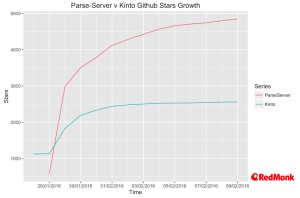On January 29th Facebook announced they were shutting down Parse, the “mobile backend as a service” provider they acquired in April 2013. The reaction from developers was loud and clear – they are very disappointed with Facebook and the overall sentiment has been resoundingly negative across sites such as Twitter and Hacker News.
The one bright spot for Facebook is the reaction to the launch of an open source version of Parse Server and a database migration tool. Alongside this there have been some public statements, although no firm commitment from Facebook, that Parse Dashboard – one of the most praised feature of Parse – may also be open sourced.
Parse Server, A Fast Growing Community
From an observer’s point of view, it has been astounding, although not surprising given the number of developers using Parse, to watch just how quickly a community has grown around Parse server. The stats are impressive. Normally when we look at github stars we look in terms of months, the graph below for Parse is an eleven day period.
Members of the Parse developer advocacy team were, justifiably, chuffed at the initial reaction
https://twitter.com/newFosco/status/692949123855732737
Among the other opensource alternatives to Parse-Server, Kinto is by far the most widely known and recently discussed. Its focus is primarily on the back end, and as we repeatedly say here at RedMonk, packaging matters, and Kinto is not known among mobile developers for being anywhere as easy to use from a frontend perspective as Parse has been.
On saying this, as you can see in the graph above, since the announcement of the Parse shutdown there has been a very significant uptick in interest in Kinto, particularly in the immediate aftermath of the Parse announcement.
Opening Opportunities
The demand for mBaaS is obvious, and multiple vendors jumped into the fray within days. The array of alternatives and options has been wonderful to see. It is testament to the value technology companies place on acquiring new developers, something we here at RedMonk are keenly aware of.
When a vendor suddenly vacates a market that is important to developers you will always see others piling in. What makes the reaction to Parse so impressive is the sheer speed with which vendors reacted. If you want an example of companies coming fast to market with a new, even if sometimes only slightly repackaged, offering, this is it.
Some of the full migrations and direct Parse alternatives we noted are
- Migrating from Parse Push to Amazon SNS (Amazon)
- Migrate from Parse to MongoDB Cloud Manager and AWS (MongoDB)
- Things to Think About Before Migrating From Parse (Kinvey)
Along with a number of other companies offering migration and import services, such as Urban Airship , GameSparks, AnyPresence and NetMera
Parse Server on Your Own Infrastructure or PaaS
Quite a number of people and companies have posted very detailed and useful blogs on how to migrate to your own managed infrastructure, which is certainly an option. The caveat here is the long term cost of maintaining and supporting said infrastructure. If you are comfortable and happy to go this route, by all means do. However, for a lot of people, and particularly for the target market of mBaaS offerings this is really not an option.
The majority of mobile developers just do not want to be concerned with managing infrastructure, and it is easy to understand why. From updates, to security, to compliance, to developing new features it is just not core to their day to day business.
The overall costs add up very quickly, and in general it will be the developer that loves tinkering with new things that will spin up such the new infrastructure. The longer term opportunity cost of having one of your more inquisitive team members maintaining a service you can buy at a fraction of their salary can become incalculable, particularly if you end up losing that team member as a percentage of their time is now spent on a job they do not really want to be doing over the longer term.
Now on noting the opportunity cost aspect, if you want to go down the route of maintaining your infrastructure or running on top of a PaaS such as Cloud, some of the more interesting examples that we have seen included:
- Running Parse on Heroku (Heroku)
- Parse on IBM Bluemix (IBM)
- Hosting Parse Server on Pivotal Web Services (Pivotal)
- Run Parse-server on Google Cloud Platform (Google)
- Complete Parse Server Migration Guide (running on Digital Ocean)
- Azure welcomes Parse developers (Microsoft)
- How to set Parse Server on AWS using AWS Elastic Beanstalk (Amazon)
- How to Run Parse Server on Ubuntu 14.0.4 ( Digital Ocean )
What About Firebase?
There are quite a number of comments suggesting using Firebase (acquired by google) as a replacement for Parse. However, the Firebase team themselves have made it clear that there is not currently an easy migration path.
And Others?
We expect to see a number of other solutions coming out in the coming weeks from various providers.
Disclosures: MongoDB, Amazon, Heroku (Salesforce), IBM and Pivotal are RedMonk clients

No Comments